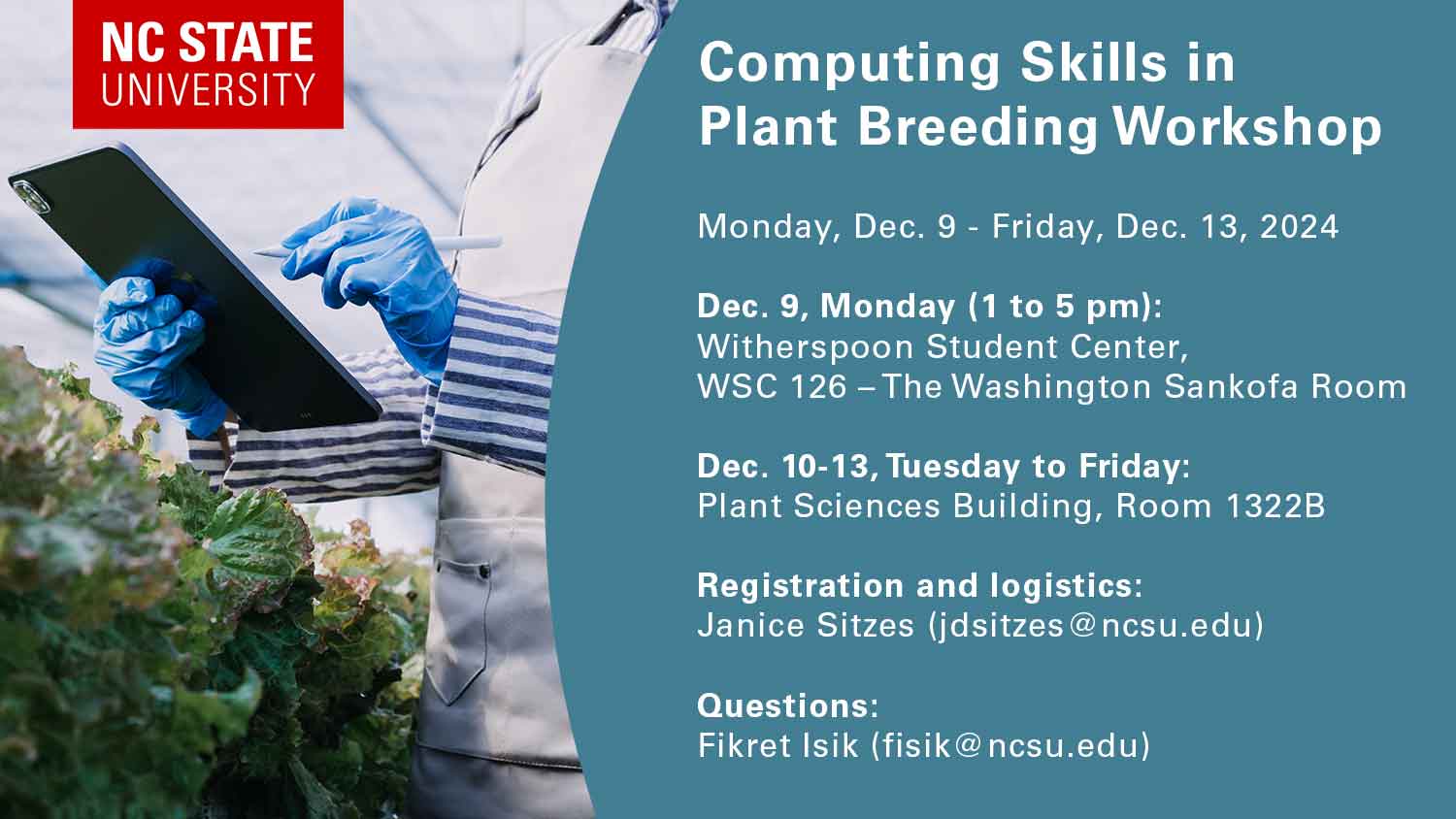Computing Skills in Plant Breeding Workshop
Organized by the NC State University Plant Breeding Consortium and Tree Improvement Program.

Why should you attend the workshop?
Computing skills are essential for plant breeders in various aspects of your work, enabling you to manage large genetic, phenotypic, and environmental datasets and conduct complex statistical analyses for decision-making. During this five-day, hands-on workshop, you will master computing skills that enhance efficiency, accuracy, and innovation in plant breeding, ultimately leading to the development of improved crop varieties.
Benefits of attending:
- Gain an understanding of theoretical concepts.
- Develop practical skills through hands-on experience.
- Enhanced collaboration and teamwork with your fellow participants.
Registration and Deadline:
The registration cost includes two coffee breaks, four lunches (Tuesday through Friday) and one dinner and electronic copies of handouts of lectures. The registration is limited to 80 people. A maximum of 30 students are accepted to the workshop.
Prerequisites: You will need to bring your laptop each day and have familiarity with linear mixed models and R programming.
Save money when you register by Friday, Nov. 1, 2024. Early registration for graduate students is $500 and for others $1250. The cancellation deadline is Sunday, December 1, 2024, and includes a $40 fee.
The regular registration deadline is Monday, Nov. 25, 2024. For graduate students, it is $600 and for others is $1500. The cancellation deadline is Sunday, December 1, 2024, and includes a $40 fee.
Locations:
Dec. 9, Monday (1 to 5 pm): NC State University, Main Campus, Witherspoon Student Center, WSC 126 – The Washington Sankofa Room, 2810 Cates Ave, Raleigh, NC 27606
Dec. 10-13, Tuesday to Friday (8 am to 5 pm): NC State University, Centennial Campus, Plant Sciences Building, Room 1322B, 840 Oval Drive, Raleigh, NC 27606
Teaching Format:
Introduction and Theory:
- Research teams present the foundational concepts.
- Cover key theories, principles, and methodologies.
- Provide context and objectives for the session.
Demos:
- Present demonstrations to illustrate theoretical concepts.
- Use practical examples and applications to enhance understanding.
- Encourage interactive engagement and ask questions from participants.
Break (15 minutes)
Practice Session:
- Participants work in small teams to apply concepts learned.
- Provide sample data sets and practical exercises.
- Encourage collaboration, problem-solving, and critical thinking.
- Faculty, post-docs, and students provide guidance and support as needed.
Overnight Accommodations:
Lodging is not included in your registration. Participants must make and are responsible for their own overnight reservations. There are several hotels in the area in addition to room blocks being held at the following locations:
Ramada Raleigh
(approximately 4 miles or 15 minutes from campus)
1520 Blue Ridge Rd
Raleigh, NC 27607
phone (919) 832-4100
ramadaraleigh.com
$89 per night plus taxes
Be sure to mention that you are participating in an NC State workshop in order to get the discounted rate.
Aloft Raleigh
2100 Hillsborough Street
Raleigh, NC 27607
$179 per night plus taxes on reservations made by November 8
Use this link to reserve a room at the Aloft using the group rate
Workshop Modules:
1. Exploring the Power of Linear Mixed Models with ASReml-R:
Theory and Application in Plant Breeding: Understanding the potential of linear mixed models as a cornerstone in the analysis of diverse datasets within plant and animal breeding. This module delves into the theoretical underpinnings and practical applications of linear mixed models, specifically leveraging ASReml-R software. By focusing on plant breeding contexts, participants gain essential skills that serve as a foundation for advanced topics such as multi-environmental and multi-year trials, as well as genomic selection models.
2. Analysis of Multi-Environmental Trials for Predictions of Genetic Merit:
This module provides comprehensive coverage of analyzing multi-environmental and multi-year data to predict breeding and genetic values crucial for selection. It starts with linear mixed models theory and follows practical demonstrations for both continuous and binary traits.
3. Quality Control, and Parentage Assignment in Plant Breeding Using DNA Markers:
This module employs DNA markers to address essential quality control aspects within breeding programs. Examples range from cultivar identification through fingerprinting to pedigree correction and population structure analysis, offering tools for enhancing breeding efficiency.
4. Image Analysis for High-throughput Phenotyping and AI:
High-throughput phenotyping generates complex data, including images captured through various methods. This module equips participants with essential software skills for streamlining image analysis in plant breeding, enhancing efficiency in phenotypic evaluations.
5. Marker-Aided-Selection:
Exploring marker-aided selection, this module delves into crucial aspects relevant to disease resistance and other traits controlled by Mendelian inheritance. Participants learn to integrate validated QTLs from QTL mapping and GWAS into routine selection processes applicable across diploid and polyploid species.
6. Imputation:
Routine application of genomics requires the imputation of missing genotypes or imputation from a low-density panel to a medium-density genotyping panel to save resources. In this module, pedigree-free software tools, such as Beagle for imputation, will be covered with real demos.
7. Genomic selection:
This module delves into the theory and practical applications of genomic selection, providing a comprehensive understanding of its differences from conventional linear mixed model predictions. Real-world examples from various crops and trees will enhance the learning experience.
8. Data Management in Plant Breeding:
Databases are essential in plant breeding for managing, analyzing, and making decisions based on vast amounts of genetic, environmental and phenotypic data. They facilitate collaboration, provide historical reference, and support informed breeding strategies, ultimately enhancing the efficiency and effectiveness of breeding programs. The module covers the foundation of data management using well-known database examples in plant breeding.
Sponsorship Opportunities
Platinum – $10,000
Recognition as an elite sponsor with the organization’s logo on the workshop registration page, event signage and program, and looping slideshow thanking sponsors; recognized at the evening reception and during welcoming remarks on Day 2; includes a sponsor table and four (3) workshop registrations.
Gold – $7,500
signage and program, and looping slideshow thanking sponsors; recognized at the evening reception on Day 1 and during welcoming remarks on Day 2; includes a sponsor table and three (2) conference registrations.
Silver – $5,000
Recognition with the organization’s logo on the conference registration page, event signage and program, and looping slideshow thanking sponsors; includes a sponsor table and two (1) conference registrations.
Bronze – $2,500
Recognition with the organization’s logo on the conference registration page, event signage and program, and looping slideshow thanking sponsors.
Friend/Student – $1,000
Recognition as a sponsor on the conference registration page and in the event program.
Important Information for ALL Sponsorship Levels
- All logos must be high resolution for website and print (EPS) and provided within two weeks of any signed sponsorship agreement. Logos will be sized and placed accordingly based on sponsorship level, depending on use.
- It may take up to five business days to upload material onto the workshop website.
- Recognition in any promotional material, per sponsorship package, is subject to pre-determined deadlines.
- Sponsorship registration and payment must be completed before recognition is received.
- Sponsors should upload their logo at https://forms.gle/7rDiC75sh9cUkwD8A or email the file to jdsitzes@ncsu.edu
Organizing Committee
- Chair: Fikret Isik
- Members: Carlos Iglesias, Gina Brown-Guedira, Jeffrey Dunne, Marcelo Mollinari, Joseph Gage, Grant Billings, Jaswinder Kaur.
